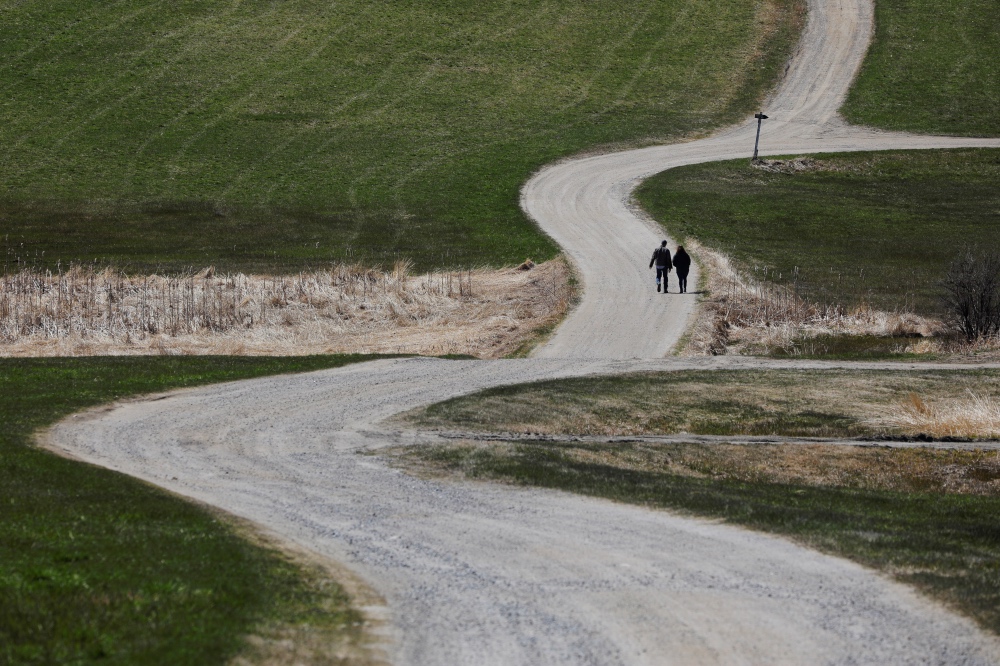New York City, US
Thomson Reuters Foundation
Tucked up against the Canadian border in northwest Montana, the Blackfeet Reservation shut itself off in March as first word of the novel coronavirus spread, prohibiting visitors and implementing curfews.
And while Montana, like half the US states, is gradually reopening businesses, the Blackfeet’s tribal council toughened their protective measures this week, expanding curfew hours and extending the stay-at-home order through May.

Two people walk along a gravel road amid the coronavirus disease outbreak in Sabattus, Maine, US, on 25th April. PICTURE: Reuters/Brian Snyder
“Even though the state is going to start opening up, the tribe said no, we’re not taking any chances,” said Renee Bear Medicine, who works at the Museum of the Plains Indians in Browning, the reservation’s headquarters.
The Blackfeet Reservation is one of many remote locations across the country – from Indigenous tribes to small towns in rural areas – that have used their geography and isolation as weapons against the coronavirus pandemic.
From Maine to Montana, tiny locales off the beaten track have closed off traffic and restricted entry to visitors. And while some states are easing their lockdowns, these secluded spots are sticking to their guns.
For the Blackfeet, the stringent measures have meant zero coronavirus cases among the 8,000 members who live on the reservation, just east of Glacier National Park, said James McNeely, the tribal spokesman.
“We just took quick action. It’s saved us,” McNeely told the Thomson Reuters Foundation. “We do not want people coming from the outside bringing the virus in.”
Health experts say the coronavirus could spread rapidly among tribes who have little immunity to diseases common in the general population and already weak immune systems, with high incidences of diabetes and heart disease.
“The council has the authority to keep the reservation closed,” McNeely said.
That sovereignty usually means tribes in America being left on their own to grapple with social issues like crime and poverty, Bear Medicine said.
“This time it was the best thing that could have ever happened to our nation,” she said.
Entry permit
The Governor of North Carolina said he hoped the state could start easing restrictions this week by reopening some businesses and parks and allowing gatherings limited to no more than 10 people.
But in rural, coastal Dare County, which comprises the popular Outer Banks vacation communities, entry during the pandemic has required a permit proving full-time residency.
The county said it would allow non-resident property owners in on a limited basis from next week.
Dare County has had at least 11 confirmed coronavirus cases and one death, while North Carolina has had more than 10,500 cases and more than 350 deaths.
“We don’t have any timeline for allowing visitors back at this point,” said Dorothy Hester, Dare County’s public information officer.
Officials and leaders said a dearth of medical facilities was key to such decisions in Dare County, the Blackfeet Reservation and in Montana’s tiny Cooke City, near Yellowstone National Park, that has been largely shut off since the outbreak began.
“They’re 50 miles from a clinic and 100 miles from a hospital. That was the reason that we wanted to go stricter,” said Laurel Desnick, health officer for Montana’s Park County, which includes Cooke City.
“They just felt like they were sitting ducks.”
With roads snowed in or closed from neighbouring Yellowstone, access to Cooke City essentially requires a snowmobile, said Meranda Smock, manager of the High Country Motel.
“It’s difficult. You have to really want to be here,” she said. She estimated the motel has lost “several thousand dollars” in bookings and worries about the summer, typically high tourist season.
Healthcare
With one clinic and one nurse practitioner, the island of North Haven, Maine, which has fewer than 400 residents, decided in mid-March to eliminate all but essential visitors.
“If you reside in places with better access to medical care than North Haven can provide you should refrain from traveling to the island,” the town’s governing Select Board said in a resolution.
Craig Falcon, a cultural education expert on the Blackfeet reservation, said tribal history played a part in its decisions to close early and remain shut.
In 1837, smallpox ravaged the Great Plains Indians, including the Blackfeet.
“We know the dangers of not taking a pandemic seriously,” Falcon said. “A virus like this today could really wipe us out.”






